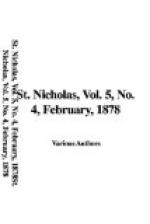“No,” said the small girl, “I don’t know. Go away!”
“Oh,” said Huckleberry, “perhaps that’s too hard for you. I know some nice little ones, in words of one syllable. Why is a red man with a green hat like a good boy who has a large duck in a small pond?”
“Go away!” said the small girl. “I came here to pick flowers. I don’t know riddles.”
“Perhaps that one was too easy,” said Huckleberry, kindly. “I have all sorts. Here is one with longer words, divided into syllables. I’ll say it slowly for you: What is the dif-fer-ence between a mag-nan-i-mous ship-mate and the top-most leaf-let on your grand-mo-ther’s bar-ber-ry bush?”
“I haven’t got any grandmother,” said she.
“Oh, well! Any grandmother will do,” said Huckleberry.
“I can’t guess it,” said the small girl, who was now beginning to lose her fear of the funny little fellow. “I never guessed any riddles. I’m not old enough.”
“Very well, then,” said Huckleberry, “I’ll tell you what I’ll do. Let’s sit down here under the tree, and I’ll tell you one of father’s riddles, and give you the answer. His riddles are better than mine, because none of mine have any answers. I don’t put answers to them, for I can never think of any good ones. I met a boy once, and told him a lot of my riddles; and he learned them, and went about asking people to guess them, and when the people gave them up, he couldn’t tell them the answers, because there were none, and that made everybody mad. He told one of the riddles to his grandmother,—I think it was the one about the pink-eyed monkey and the wagon-load of beans—”
[Illustration: THE BOY AND HIS GRANDMOTHER.]
“No,” said the small girl; “the elephant and the gold-fish was the other part of the pink-eyed monkey one.”
“Oh, it don’t make any difference,” said Huckleberry, “I don’t join my riddles together the same way every time. Sometimes I use the gold-fish and elephant with the last part of one riddle, and sometimes with another. As there’s no answer, it don’t matter. I begin a good many of my best riddles with the elephant, for it makes a fine opening. But, as I was going to tell you, this boy told one of my riddles to his grandmother, and she liked it very much; but when she found out that there was no answer to it, she gave him a good box on the ear, and that boy has never liked me since. But now I’ll tell you a story. That is, it’s like a story, but it’s really a riddle. Father made it and everybody thinks it’s one of his best. There was once a fair lady of renown who was engaged to be married to a prince. And when the wedding-day came round—they were to be married in one of the prince’s palaces in the mountains—she was so long getting dressed—you see she dressed in one of her father’s palaces, down in the valley—that she was afraid she would be late, so as soon as her veil was pinned on, she ran down to the stables, threw a wolf-skin on the back




